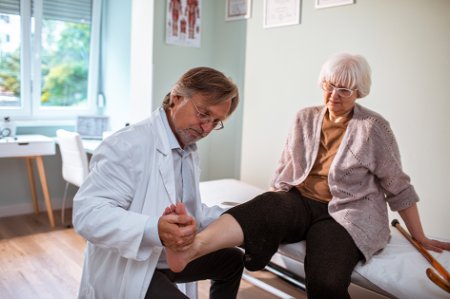Martina's story
Martina* started seeing the first signs of dementia a couple of years ago when it started to affect her ability to drive, which was an important part of her job.
 ‘I started to forget where I was when I was driving… I was falling, I was tripping, I was just not really being aware of my own self. I didn’t feel like myself.’ About 8–12 months later, she was diagnosed with Lewy body disease – a type of dementia that has similarities with Alzheimer’s disease and Parkinson’s disease. Symptoms of Lewy body disease may include fluctuating mental states, confusion, issues with concentration, difficulty judging distances (which leads to falls), hallucinations and tremors.
‘I started to forget where I was when I was driving… I was falling, I was tripping, I was just not really being aware of my own self. I didn’t feel like myself.’ About 8–12 months later, she was diagnosed with Lewy body disease – a type of dementia that has similarities with Alzheimer’s disease and Parkinson’s disease. Symptoms of Lewy body disease may include fluctuating mental states, confusion, issues with concentration, difficulty judging distances (which leads to falls), hallucinations and tremors.
Although Martina knew things weren’t quite right, she says family and friends didn’t seem to be aware of it at the time. Martina can no longer drive and had to hand in her licence. Other than that, she and her partner of 15 years live day by day and try not to worry about it too much.
‘When I was first diagnosed I thought “Oh that's it I'll be in a nursing home”. But as time goes along I've just learned to cope with it and thought “Ah well if that's the case, I'll just keep going and keep looking forward to the future.”’
Martina lives in a rural part of Australia. She would have to travel to see a specialist, but at this stage she hasn’t needed to. Her local GP is just 5 minutes away and she has no trouble getting an appointment when she needs one.
‘I have great help here and feel well supported... I get help through the NDIS [National Disability Insurance Scheme] and help and support through my home care package as well.’ This includes assistance with day-to-day life, such as house cleaning, as well as help with health services, such as physiotherapy.
Dementia Australia helped to organise the home care package and, for the moment, she is getting the assistance she needs. Home Care Packages provide community-based care to people with greater or more complex care needs (see Aged care and support services for people with dementia for more information on aged care services available to eligible Australians).
‘I’m actually not too worried about it [dementia] any more,’ she says.
*This case study is based on an interview with a person who has dementia. This personal account is not necessarily representative of the circumstances of other people with dementia or the challenges they may face, but it is our hope that it will give readers a greater awareness and understanding of the diversity of people’s experiences with dementia.
*Names and identifying characteristics have been changed. Image is not representative of individuals in the story.


